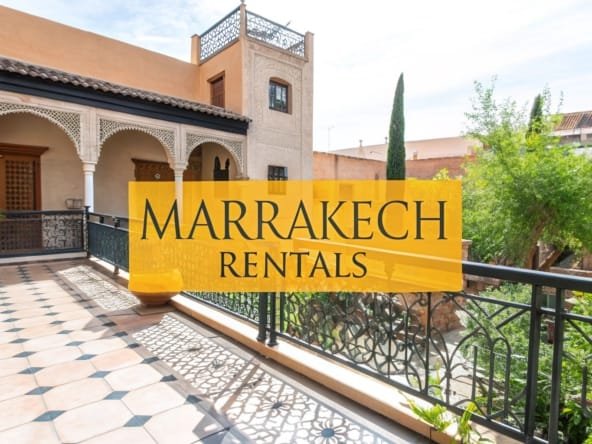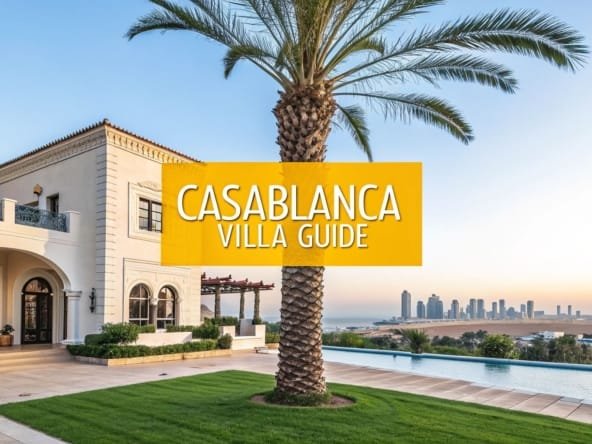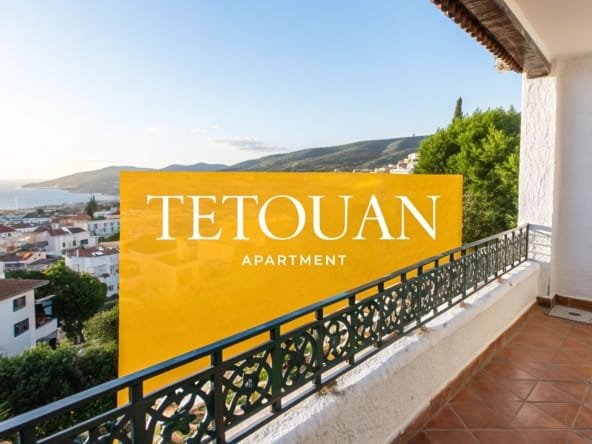Finding the right appartement a louer a essaouira is more than just securing a place to stay; it's about unlocking a unique lifestyle in a city that beautifully marries ancient Moroccan tradition with a breezy, artistic spirit. Whether you're dreaming of a modern one-bedroom flat for a solo adventure or a grand riad for the family tucked inside the historic Medina walls, the secret lies in knowing where to look and how to navigate the local market.
Your Guide to Renting an Apartment in Essaouira
The first step in finding your perfect Essaouira home is getting a real feel for the local rental scene. The city offers a fantastic spectrum of choices. You’ll find everything from lovingly restored riads hidden down winding alleyways in the old city to sleek, modern apartments boasting ocean views along the corniche. What you choose will really come down to your personal style, budget, and how long you plan to stay.
Understanding the Rental Landscape
To find the best listings, you'll want to blend modern tech with some good old-fashioned networking. Online platforms like Avito.ma are a great place to start your search, with plenty of properties listed directly by owners.
However, don't overlook the local real estate agents (agences immobilières). These folks have incredible on-the-ground knowledge and often hold the keys to properties you won't find anywhere else. Sometimes, the truly great deals come from word-of-mouth, so tapping into the local expat community or just chatting with residents can lead you to some hidden gems.
It's also important to understand the difference between a long-term lease and a short-term holiday rental right from the start.
- Long-Term Leases (Contrat de Bail): These are typically for a full year and give you stability with a much lower monthly rent. They're the way to go if you're relocating, working remotely, or settling in for an extended period.
- Short-Term Lets: These can range from a few nights to several months. They almost always come furnished but at a higher price point. The trade-off is flexibility, making them perfect for tourists or anyone wanting to try out the city before making a longer commitment.
The image below gives you a clear idea of what you can expect to pay per month for long-term rentals based on size.
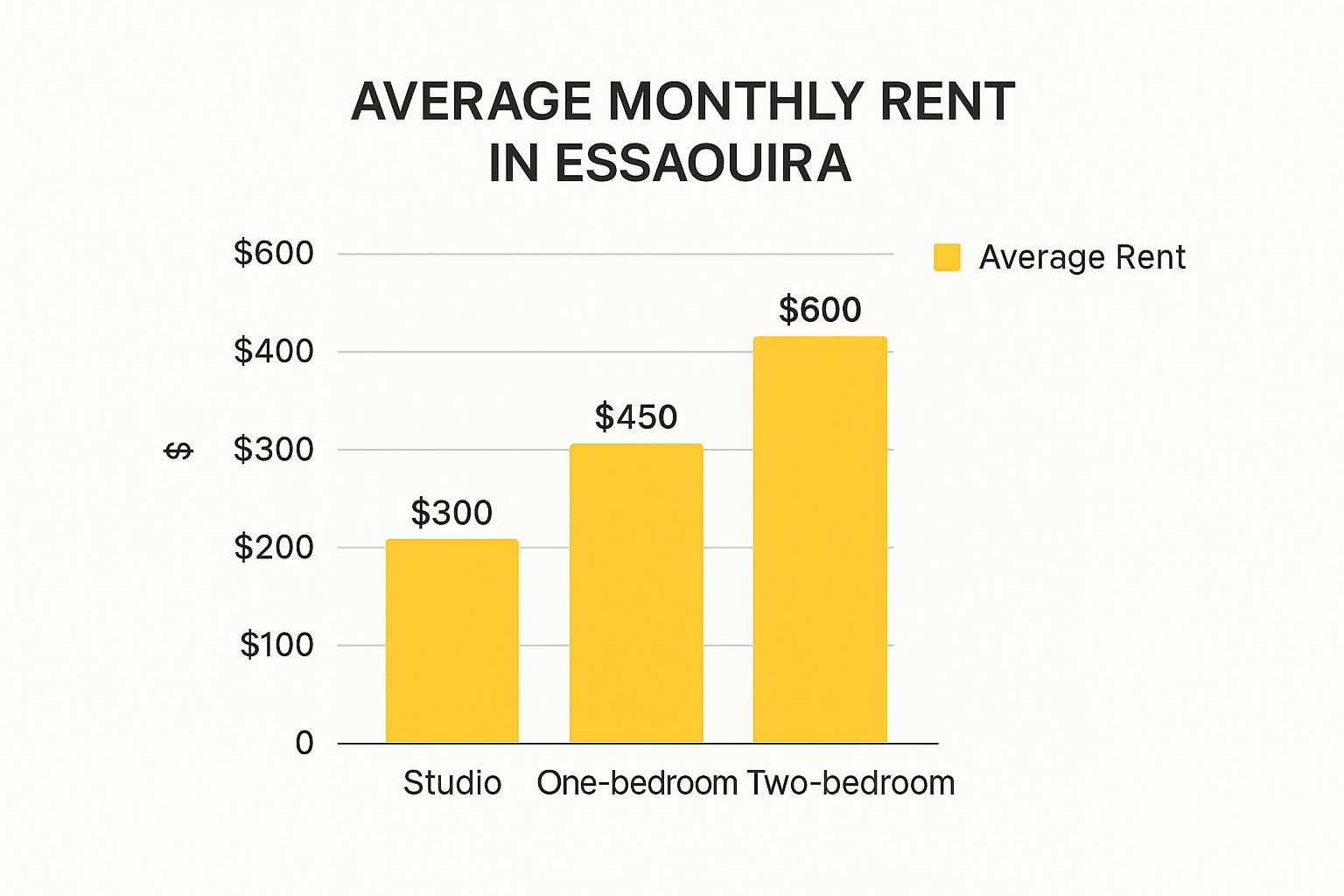
As you can see, rental prices scale quite logically with the apartment's size, which is a great starting point for figuring out your budget.
Market Preferences and Trends
The short-term rental market offers some interesting insights into what visitors are looking for. Recent data shows a clear preference for smaller spaces, with one and two-bedroom apartments accounting for a massive 62.4% of all active listings. This points to a huge demand from couples and small groups.
But don't think it's all small-scale. The market is surprisingly diverse, with over a quarter of properties able to accommodate six or more people, making it a great destination for families and larger groups, too.
Let's take a look at the most common rental types and who they're for.
Essaouira Rental Market at a Glance
This table breaks down the most popular types of rental apartments you'll find in Essaouira, giving you an idea of what's available and who typically rents them for short-term stays.
| Apartment Type | Typical Occupancy | Best For | Market Share (Short-Term) |
|---|---|---|---|
| 1-Bedroom | 2 Guests | Solo Travellers, Couples | 33.3% |
| 2-Bedroom | 4 Guests | Small Families, Groups | 29.1% |
| 3-Bedroom | 6 Guests | Larger Families, Groups | 14.8% |
| 4-Bedroom | 8 Guests | Large Groups | 6.4% |
| Studio | 1-2 Guests | Budget Travellers, Solo | 4.3% |
This data confirms that while smaller units are the most common, there's a healthy supply of larger apartments to meet various needs.
The sweet spot in the market seems to be properties that accommodate four guests, which make up 25.4% of all short-term rentals. This really highlights Essaouira's flexibility as a destination that caters to all kinds of travellers.
With this foundation, you're well on your way. If you're ready to see what's out there, a great next step is to browse curated listings for an appartement a louer a essaouira. This will help you move forward with confidence as you start exploring neighbourhoods, costs, and the rental process itself.
Choosing the Right Essaouira Neighbourhood
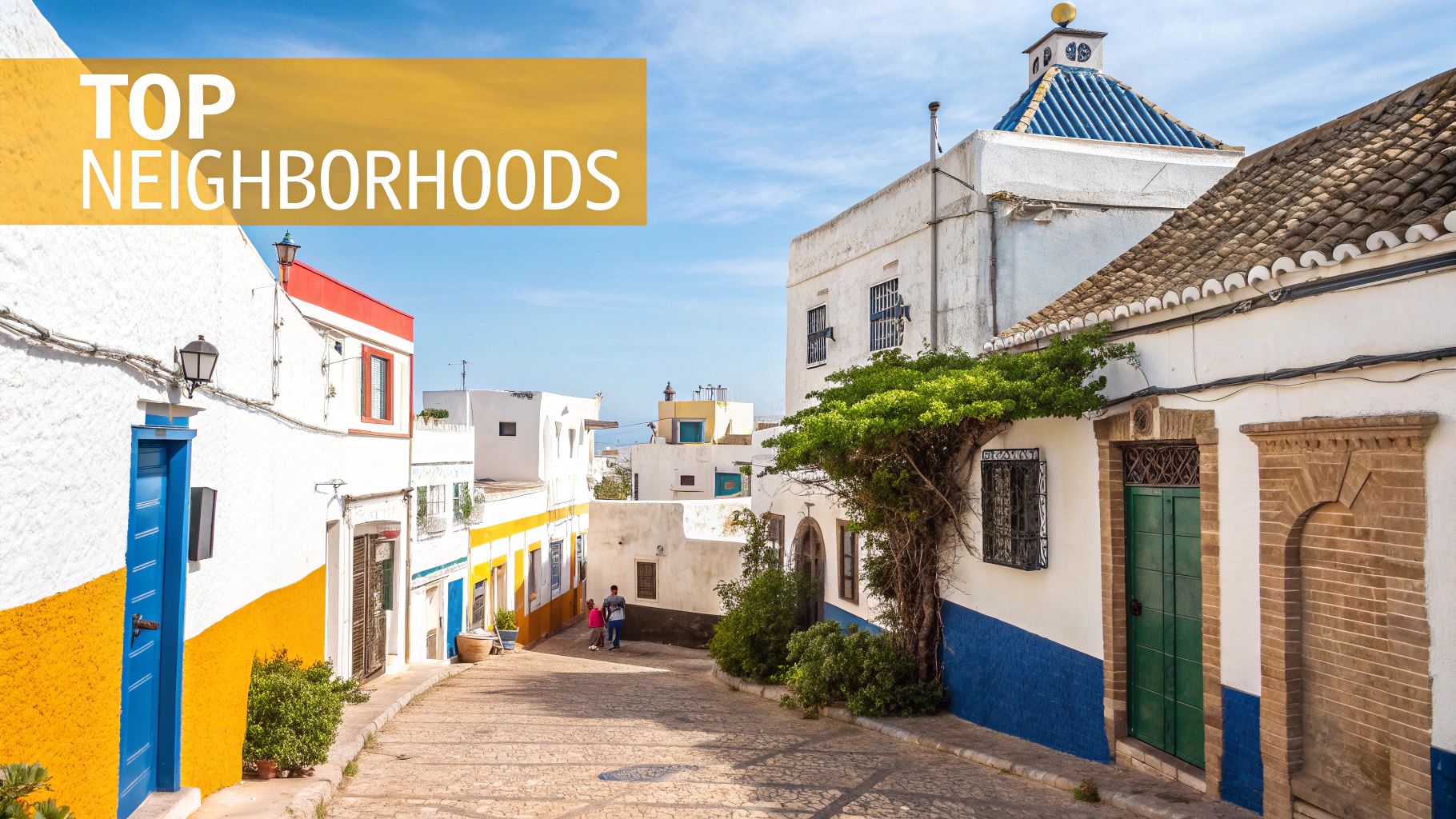
Finding the right appartement a louer a essaouira is less about the property itself and more about the neighbourhood. Where you choose to live will fundamentally shape your experience of this city. It’s the difference between waking up to the call to prayer echoing through ancient alleyways and falling asleep to the sound of Atlantic waves.
Essaouira isn't a monolith; it's a collection of distinct districts, each with its own character and rhythm. Your ideal spot hinges on the lifestyle you’re chasing. Let’s get beyond the postcard views and talk about what it’s really like to live in each of Essaouira’s key areas.
The Historic Medina: For Full-Throttle Cultural Immersion
Living inside the UNESCO-listed Medina is an experience that stays with you. This is the city's ancient, beating heart—a labyrinth of blue-shuttered, whitewashed alleys humming with the energy of artisan workshops, spice markets, and hidden cafés.
If you're after pure authenticity and want to dive headfirst into Moroccan life, look no further. The housing here consists of traditional riads and dars (courtyard homes), many of which have been beautifully converted into apartments. They often boast stunning original features, from intricate zellige tilework to hand-carved cedar ceilings.
The Medina is for those who prioritise atmosphere over convenience. You'll trade easy car access for the magic of stepping out your door and into a world alive with history, art, and the constant, vibrant buzz of the souk.
But it comes with trade-offs. The narrow streets mean no cars, so be prepared to carry your groceries. And while many homes are beautifully restored, the coastal air can bring a certain dampness to older buildings. For anyone working online, it’s also worth noting that internet connections can be less reliable here than in the newer parts of town.
The Beachfront District: For Sun, Surf, and Sea Breezes
Stretching along the city's magnificent bay, the beachfront presents a completely different lifestyle. This area is all about the wide, sweeping corniche, the vast sandy shores, and an Atlantic horizon often peppered with kitesurfers. If your perfect morning involves a surf session followed by a coffee overlooking the ocean, this is your zone.
Apartments here are typically more modern, found in newer buildings that often feature balconies and, for a premium, direct sea views. You'll find a good mix of one, two, and three-bedroom flats, popular with expats and Moroccan families alike.
- Accessibility: Unlike the Medina, this area is a breeze to navigate by car, with plenty of parking available.
- Amenities: You're just a short walk from beach clubs, a wide array of restaurants, and local convenience shops.
- Lifestyle: It has a relaxed, almost holiday-like feel that’s perfect for active people and families who love being outdoors.
On the flip side, it lives up to Essaouira's "Windy City of Africa" nickname—it can get seriously breezy. During the summer months, it can also become quite crowded with tourists. And naturally, any appartement a louer a essaouira with that coveted sea view will be at the higher end of the price scale.
Residential Zones: For Quiet Living and Practicality
For those planning a longer stay, especially families or anyone who values peace and quiet, the residential neighbourhoods just outside the tourist core are a fantastic option. Areas like Borj and Azlef offer a more local, tranquil living experience.
Here, you'll find larger, more modern apartments and even villas, some with private gardens. These neighbourhoods are quieter, with a stronger sense of a settled community, making them a top choice for long-term expats.
The biggest draw is practicality. Infrastructure is generally better, including more reliable fibre optic internet—a deal-breaker for most digital nomads. You'll also find bigger supermarkets, easier access to schools, and other family-focused services. You might need a petit taxi to get to the Medina or the beach, but the trade-off is more space, modern comforts, and often, a better price.
Ultimately, the best fit is personal. A remote worker might choose a modern flat in Borj for its guaranteed high-speed internet, while an artist might be drawn to a historic dar in the Medina to soak in the creative energy. A family, meanwhile, would likely prioritise the space and community feel of a residential villa, away from the hustle and bustle.
Cracking the Code on Rental Costs and Budgeting
Finding the right appartement a louer a essaouira is about more than just falling in love with a place and agreeing on the monthly price. To really settle in without any financial headaches, you need a clear picture of all the costs involved. The rent is just the headline number; the real cost of living comfortably in Essaouira includes a handful of other monthly expenses you’ll want to anticipate from the start.
It goes without saying that the rent itself can swing quite a bit. A modern, furnished flat with a sweeping ocean view will naturally sit at the higher end of the market. On the other hand, you can find much more affordable options if you look for an unfurnished place in a quieter, more residential part of town. The building's age and overall condition are also big factors.
Looking Beyond the Monthly Rent
To avoid any nasty surprises, your budget needs to account for more than just the rent. These are the little things that often trip up newcomers but are completely standard for any long-term rental in Morocco.
Think about these ongoing costs:
- Utilities (Water and Electricity): You'll pay for these based on what you use. Keep in mind that running the air conditioning in the summer or electric heaters in the winter can make your electricity bill jump.
- Internet: A solid internet connection is a must for most of us. You'll need to sign a contract with a provider like Maroc Telecom or Orange, which comes with a monthly fee.
- Syndic Fees: In most apartment buildings, there’s a monthly fee for the syndic (building management). This covers the upkeep of shared spaces like the stairwells, lift, and any security services.
- Gas Bottles: A lot of kitchens here run on bottled gas for cooking. It's not expensive, but it's a small, regular cost you'll have as you swap out empty bottles for full ones.
Don't forget the upfront costs. Before you even move in, landlords will ask for a security deposit. This is usually one or two months' rent, and you'll get it back when you move out, as long as the apartment is in good shape.
Putting Together a Realistic Monthly Budget
To make this all a bit more tangible, let's sketch out a sample budget. This should give you a solid framework for figuring out your own potential expenses as you start your apartment hunt. Knowing your numbers not only helps you filter your search but also puts you in a much stronger position when it's time to talk terms.
Here’s an estimated monthly breakdown for a standard two-bedroom apartment. We're assuming it's in a central area but not a prime beachfront spot.
Sample Monthly Budget for Renting in Essaouira
| Expense Item | Estimated Cost Range (MAD) | Notes |
|---|---|---|
| Rent (Unfurnished) | 4,000 – 6,000 | Highly variable based on location and condition. |
| Electricity | 200 – 400 | Depends heavily on seasonal usage (heating/cooling). |
| Water | 50 – 100 | Generally quite affordable for average use. |
| Internet | 200 – 300 | Standard fibre optic or ADSL contract. |
| Syndic Fee | 100 – 250 | Varies by building amenities and services. |
| Total Estimated Monthly Cost | 4,550 – 6,950 | Excludes one-time deposit and furnishing costs. |
This table gives you a great starting point. For a much more detailed look at day-to-day spending, from groceries to transport, be sure to read our complete guide to the cost of living in Morocco.
Why a Healthy Market Matters for Renters
Even if you're only planning to rent, it's reassuring to know that you're in a stable and thriving property market. Essaouira's real estate scene is surprisingly robust, which is a good sign of the city's overall economic health and appeal.
Investors are drawn here because well-located properties can deliver annual rental yields between 5% and 7%. It’s not uncommon for a beautifully renovated riad, for example, to pull in tens of thousands of euros in rental income each year. This underlying financial stability is what keeps the rental market healthy, ensuring a steady supply of quality homes for people like you.
Navigating Rental Agreements and Paperwork in Essaouira
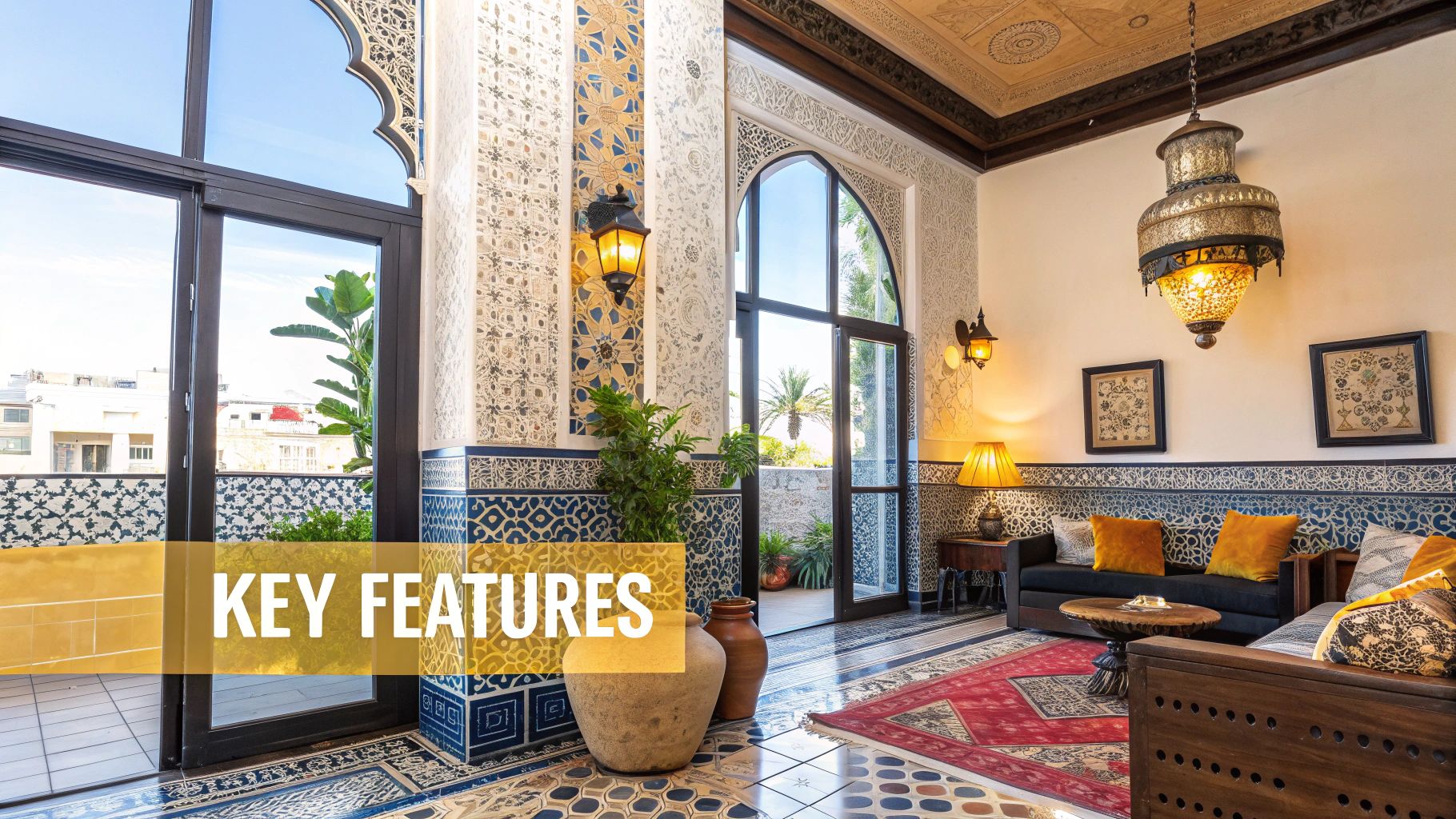
So, you’ve found the perfect appartement a louer a essaouira. Now it's time to make it official. This next stage is all about paperwork, transforming your handshake deal into a solid, legally-binding agreement. It might sound daunting, but the process here in Morocco is surprisingly straightforward once you know the steps. Getting this part right is your key to a secure and happy tenancy.
The whole thing kicks off the moment you make a formal offer. This is more than just a casual chat; it’s a clear signal of your intent to rent. This is also your golden opportunity to negotiate. Want to see if the landlord will budge on the rent? Need a fresh coat of paint before moving in? Now is the time to ask.
The Essential Documentation You Will Need
Before any ink hits the paper, you'll need to get your documents in order. Landlords and agencies need to verify who you are and that you’re legally able to rent. What you need can differ slightly depending on your nationality.
For Moroccan citizens, it's quite simple:
- A copy of your Moroccan national identity card (CIN – Carte d'Identité Nationale).
- Proof of your income, like recent salary slips or a bank statement, to show you can comfortably cover the rent.
For expats, the list is a bit longer, but nothing you can't handle:
- A copy of your passport (the main photo and details page).
- A copy of your Moroccan residency permit, the carte de séjour. If you're still waiting for it, a copy of the application receipt (récépissé) is usually fine.
- Proof of income is also a must. This could be a letter from your employer or bank statements from your home country.
Having these documents ready to go from the start makes a huge difference. It shows the landlord you’re serious and organised, which can really speed things up and put you at the top of their list.
Decoding the Moroccan Rental Contract
The heart of the entire deal is the contrat de bail—the official lease. It’s absolutely vital to understand what’s in this document before you sign. While most contracts follow a standard template, you should never sign anything you haven't read and fully grasped. If your French or Arabic isn't quite there yet, ask a trusted friend or hire a professional translator to go over it with you. It's a small investment for major peace of mind.
A good rental contract protects both you and the landlord by clearly laying out the ground rules.
Key Takeaway: A detailed, clearly written rental contract is your number one legal safeguard. It defines the rules of your tenancy and prevents future headaches, making it the most important document you'll sign.
Make sure you pay close attention to these key clauses:
- Lease Duration (Durée du Bail): In Morocco, the standard long-term lease is for one year. Your contract should clearly state the start and end dates.
- Notice Period (Préavis): This clause explains how much notice you need to give before moving out, which is usually one to two months. It also covers the notice the landlord must give you if they don't plan to renew the lease.
- Rent and Payment Details: The contract must specify the exact monthly rent in Moroccan Dirhams (MAD), the payment due date, and how it should be paid (usually bank transfer).
- Repair Responsibilities: This is a big one. Typically, the landlord is on the hook for major structural issues (roof, plumbing, electrics), while you handle minor day-to-day upkeep. Make sure this is spelled out clearly.
The Final Step: Registration and Legalisation
Once you and the landlord have both signed the contrat de bail, there's one last, critical step: legalisation and registration. This involves taking the signed contract to the local administrative office (muqata'a) to be officially stamped and recorded.
Don't skip this. This is what makes your contract legally enforceable. An unregistered contract offers you very little protection under Moroccan law. Registration ensures your rights as a tenant are fully recognised, giving you legal standing if a dispute ever arises over your deposit, eviction, or other issues. The landlord usually takes care of this, but you should always ask for a copy of the registered document for your own files.
For a deeper look into the legal nuances, our guide on what they don't tell you about renting in Morocco is a great resource. Completing this final step solidifies your agreement, letting you finally grab those keys and start your new life in Essaouira with confidence.
Getting a Feel for the Place: What to Look for During a Viewing
So you've narrowed down your list and have a few viewings lined up for an appartement a louer a essaouira. This is where the real work starts. A thorough inspection is absolutely crucial—it’s the only way to protect yourself from headaches and hidden expenses down the line.
Don't just do a quick walkthrough. You need to get hands-on. Open every single window. Flick all the light switches. Turn on the taps and let them run for a minute. It might feel a bit awkward, but you’re not being difficult; you're being a savvy renter. You’re there to see the apartment as it truly is, not just the polished version presented for a showing.
Uncovering Potential Structural and Utility Problems
Essaouira is stunning, but its coastal climate brings one major challenge to buildings: damp. The salty sea air is relentless, so checking for signs of humidity should be your number one priority.
Keep an eye out for these classic giveaways:
- A musty smell that goes beyond just an "old building" scent.
- Water stains or discoloured patches on the walls and ceilings, particularly in corners.
- Paint that's peeling, bubbling, or flaking, which is a sure sign of moisture trapped underneath.
Once you’ve assessed for damp, shift your focus to the apartment's essential systems. Check the plumbing thoroughly. Flush the toilets and run every tap to check for leaks and, just as importantly, water pressure. Dribbly showers get old fast. At the same time, test a few electrical outlets with a phone charger and flip all the light switches to make sure the wiring is up to scratch.
Here's a pro-tip I've learned from experience: always check for noise. If you can, visit the property at different times. That quiet, charming street you saw at 11 a.m. could easily become a major shortcut for evening traffic or the local hotspot for late-night gatherings.
Connectivity and Modern Comforts
These days, a good apartment needs more than four walls and a roof. For anyone working from home or just staying connected, reliable internet is non-negotiable.
As you walk through the apartment, take out your phone. Check the mobile signal in every room. Finding a dead zone right where you planned to set up your home office is a deal-breaker you need to know about upfront.
Be direct and ask about the internet situation. Which providers are available in the building? Is high-speed fibre optic an option? It's always best to verify this yourself with the providers, rather than just taking the landlord's word for it.
The rental market in Essaouira is incredibly active right now, thanks in large part to Morocco's booming tourism. With a 20% increase in tourist arrivals in 2024, the demand for quality rentals is high. This can sometimes lead to properties being put on the market before they're truly ready. For more insight into how market trends are affecting rental prices, the data at Sands of Wealth offers a great overview of Morocco's property price forecasts and foreign investment growth.
Avoiding the Most Common Rental Traps
Finding a great apartment means nothing if the rental agreement lets you down. The single biggest mistake renters make is trusting verbal agreements. If the landlord promises to repaint the bedroom, fix that dripping tap, or bring in a new fridge—get it in writing. A quick email confirming your conversation or, even better, an addendum to the lease, is your only real protection.
Before you sign anything, read the contract from start to finish. I mean really read it. Look closely at clauses detailing the security deposit return, who is responsible for what maintenance, and any mention of extra fees. The fine print is often where unpleasant surprises hide. A little diligence here is the final step in ensuring your search for an appartement a louer a essaouira ends with a place you'll genuinely love living in, not a source of constant problems.
Frequently Asked Questions About Renting in Essaouira
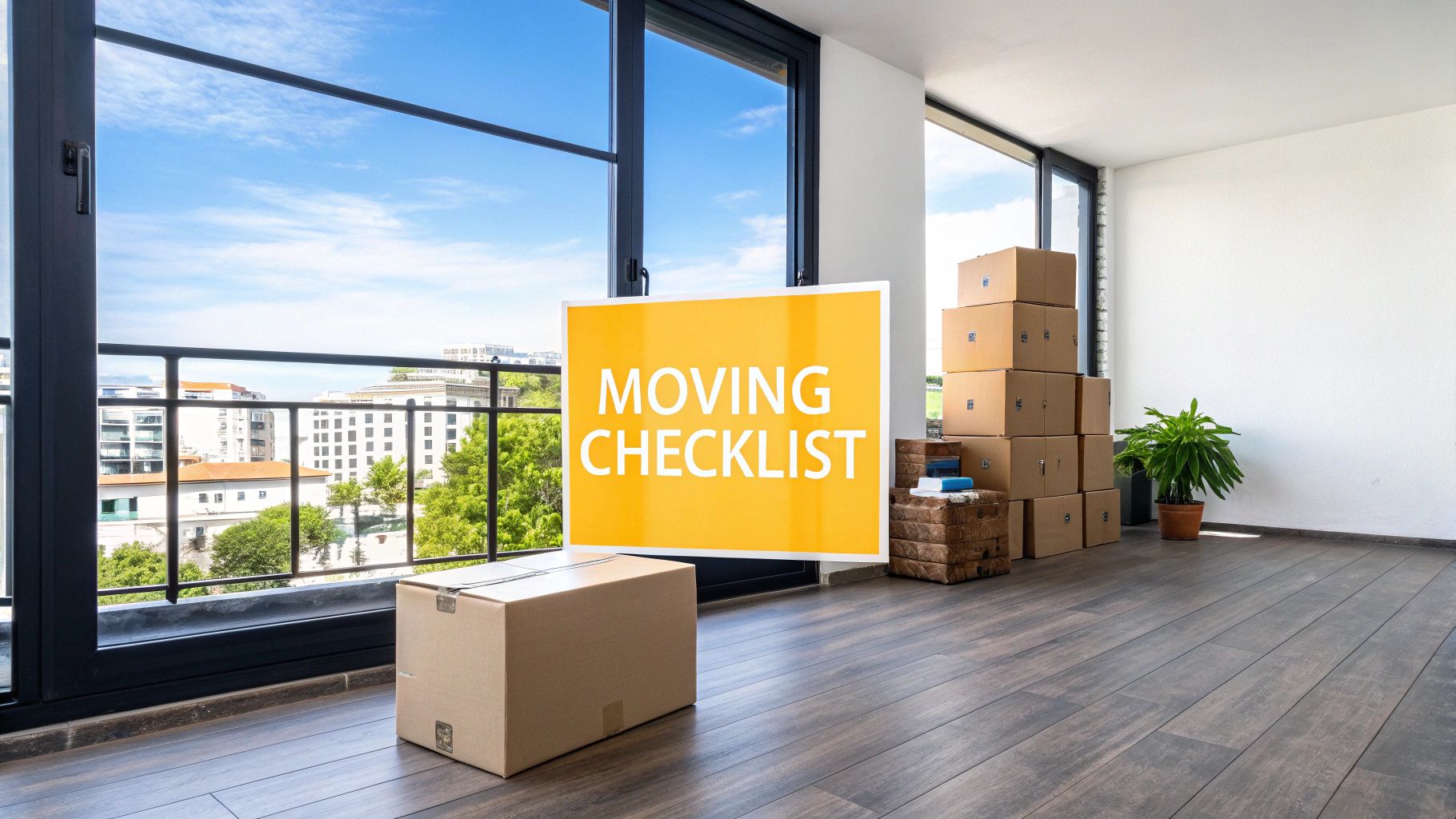
Once you start getting serious about finding the perfect appartement a louer a essaouira, you'll inevitably have questions. Diving into a rental market in a new city, let alone a new country, always comes with a learning curve. I've gathered the most common queries I hear from renters to give you clear, practical answers and help you move forward with confidence.
Do I Need a Moroccan Bank Account to Rent an Apartment?
While you might not find a law that explicitly requires it for every rental, a Moroccan bank account is practically non-negotiable for a long-term lease. Most landlords I work with much prefer the consistency and paper trail of a bank transfer over handling cash each month. It's just cleaner for everyone.
Plus, a local account will make your life a whole lot easier. It's the simplest way to pay your utility bills, as you can set up direct debits for water and electricity. If you're an expat, I always recommend opening a convertible dirham account. It keeps all your local finances tidy and easy to manage.
You might get away with cash for a very short, informal let. But for any formal lease of six months or more, a local bank account signals to landlords that you're organised, settled, and serious. It builds trust from day one.
What Are My Rights as a Tenant in Morocco?
In Morocco, your rights as a tenant are legally protected, and your contrat de bail (rental contract) is your most important document. Knowing your rights is the key to a stress-free tenancy.
One of the most fundamental rights is the "quiet enjoyment" of your home. This means your landlord can't just pop in whenever they like. They must have your permission to enter the property, except in a genuine emergency or for pre-arranged maintenance.
The landlord is on the hook for major structural repairs—things like the roof, the building's main plumbing, or the core electrical system. Your responsibility is the day-to-day upkeep and minor fixes inside the apartment.
Landlords can't just raise your rent on a whim. Moroccan law regulates rent increases, which can typically only be proposed after three years. Even then, they must follow a specific legal framework. Most importantly, a landlord cannot evict you without a formal court order.
To make sure your rights are fully enforceable, always insist that your contract is officially registered with the local authorities (the muqata'a). An unregistered contract can leave you in a very vulnerable position.
Is It Better to Rent a Furnished or Unfurnished Apartment?
This really boils down to your personal circumstances—mainly, how long you plan on staying in Essaouira. Both options have their pros and cons, so it’s a classic trade-off between convenience and long-term cost savings.
-
Furnished Apartments: These are the turn-key solution. They're perfect if you're here for a shorter term, are a digital nomad with just a couple of suitcases, or simply want to avoid the headache of buying furniture right away. The trade-off? That convenience comes at a premium, and the monthly rent will always be higher.
-
Unfurnished Apartments: This is the smart financial move for anyone planning to stay for a year or longer. The rent is noticeably lower, and those savings add up significantly over time. You’ll have the upfront cost of buying furniture and appliances, but you also get total freedom to design a space that truly feels like home.
My advice is to do a quick breakeven analysis. Figure out how many months of lower rent it would take to pay for the furniture you'd need to buy. If your intended stay is longer than that, an unfurnished place makes more financial sense.
How Reliable Is the Internet in Essaouira for Remote Work?
You'll be pleasantly surprised. The internet infrastructure in Essaouira is solid and more than capable of handling the demands of remote work. The city has good coverage from Morocco's major providers—Maroc Telecom, Orange, and Inwi.
High-speed fibre optic internet is now available in many parts of the city, not just in the new developments but also within the Medina walls. If fibre hasn't reached your specific building, the ADSL connections are generally stable enough for video calls and daily work.
Before signing a lease, just be sure to ask which providers service that building and what kind of speeds you can realistically expect. On top of that, the 4G and 5G mobile networks are excellent, giving you a fast and reliable backup if your home connection ever blips. And if you need a change of scenery, you're never far from a café with strong, free Wi-Fi.
Navigating the Essaouira rental market can be a rewarding journey. At Rich Lion Properties, we specialise in making that journey smooth and successful. Whether you're searching for your dream apartment or need expert guidance on the local market, our team is here to help you every step of the way. Explore your options with us at https://richlionproperties.com.

